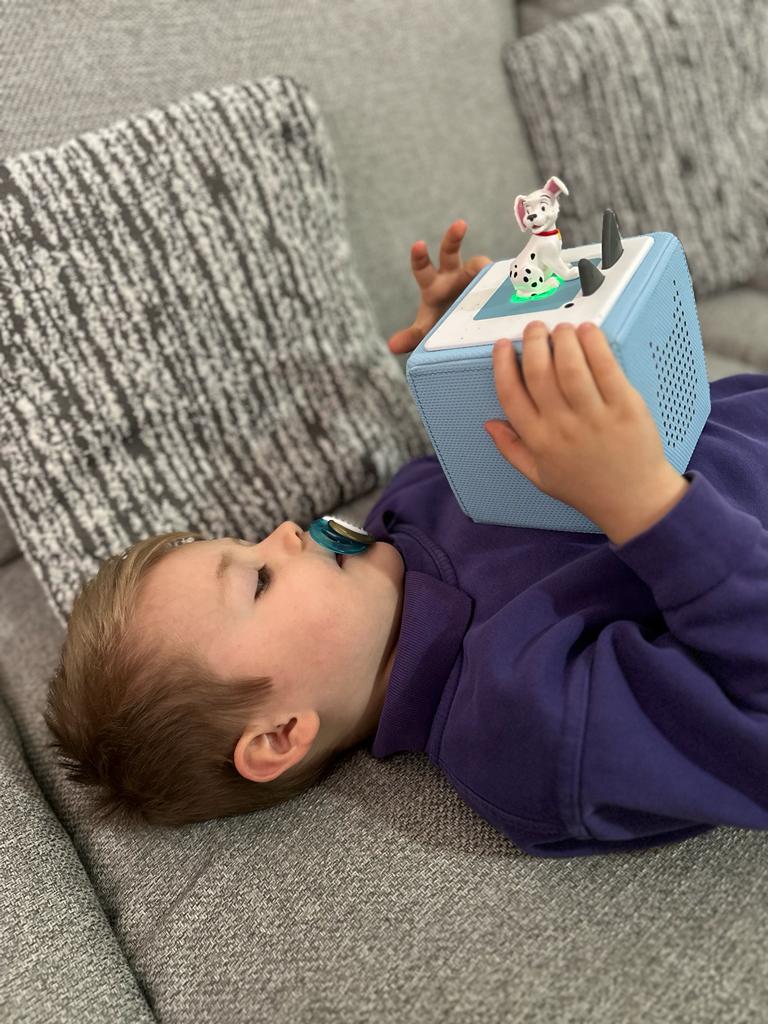How fischertechnik can positively influence the PISA results
PISA stands for “Programme for International Student Assessment”. The PISA study has been carried out every three years since 2000. It tests skills in reading, maths and science. The most recent PISA survey was conducted in 2022. This time, the focus was on mathematical skills. In addition, students’ creative thinking was assessed for the first time.
81 countries worldwide and more than 600,000 15-year-olds took part in PISA 2022. The sample, which is representative for Germany, comprises around 13,000 students aged 15 from all school types.
The test tasks are not based on specific curricula, but on competences that are important for the learning process and the acquisition of knowledge. In addition, pupils, teachers, school administrators and parents answered questions on socio-economic background, learning times and learning environment, computer use and lesson organisation as well as on the attitudes and expectations of young people.
The PISA studies are based on a differentiated concept of competences. In the area of reading literacy, for example, PISA primarily examines the ability to understand the meaning, intentions and form of different types of written texts and to place them in a wider context. Mathematical literacy means having a basic understanding of maths and its importance in our cultural and technical world. Scientific competence means understanding basic scientific relationships and being familiar with scientific ways of thinking and working.
The academic performance of fifteen-year-olds in maths, reading and science has fallen noticeably. The prolonged restrictions on school operations and other pandemic-related restrictions have contributed to the negative developments. In addition, the pupil population has become more heterogeneous and the proportion of pupils from families at social risk has risen sharply in recent years. The connection between social background and educational success remains strong.
What pupils currently need to be strengthened and supported in are the so-called future skills. These include digital skills, but also STEM knowledge and social and emotional expertise.
Students who see themselves as agents of their own learning are also more likely to “learn to learn” – an invaluable skill that they can use throughout their lives.
(OECD Learning Compass 2030)
What is the fischertechnik learning continuum?
This is where the fischertechnik learning continuum comes in. It offers everyday, skills-orientated learning content that is developed with the high-quality fischertechnik building blocks. The easy-to-use hardware and software supports a sustainable learning experience. Teachers are supported by comprehensive materials and can thus prepare for teaching with fischertechnik in a targeted manner and without great effort.

What does the fischertechnik learning concept include?
The fischertechnik learning concepts can be used in group work or as class work. By assembling and trying out the models independently, pupils learn to work in a team and to think creatively. This action-orientated, self-regulated learning approach facilitates learning and promotes important social and emotional skills.
Pupils learn about important technical components such as controllers, motors, sensors, compressors, capacitors and LEDs. The age-appropriate graphic or text-based programming (Blocky/Scratch/Python) in the fischertechnik app provides a child-friendly introduction to the world of programming. Offline use is possible at any time.
The models are quickly assembled with the enclosed assembly instructions focussing on the learning objectives. Robust storage boxes for easy re-sorting make the learning concept a stable companion in technology lessons.
The learning continuum contains a comprehensive introduction to the topic as well as exciting tasks with suggested solutions for the teacher. First-step instructions and video tutorials on the website make it easier to get started. In addition, fischertechnik offers teacher training courses on pedagogy, didactics, methodology and use in the classroom.
All fischertechnik learning concepts are developed in close cooperation with teachers and industry experts. They are tailored to specific school types, grade levels, and aligned with the curriculum. Extensive support for teachers How to integrate fischertechnik into your lessons The right support for your teaching projects • First steps instructions • Introduction to the fischertechnik building block and videos for an easy start • Comprehensive content including topic introduction to all STEM concepts, hands-on learning, future skills, technical components and software environment for all relevant platforms • Teaching materials incl. curriculum references, task sheets, building and programming instructions (also in the app), solutions and lesson plans • Suitable packaging and storage solutions for all learning concepts • Competent advice and further training offered by fischertechnik or certified trade partners • Easy reordering of individual parts through fischertechnik or certified trade partners
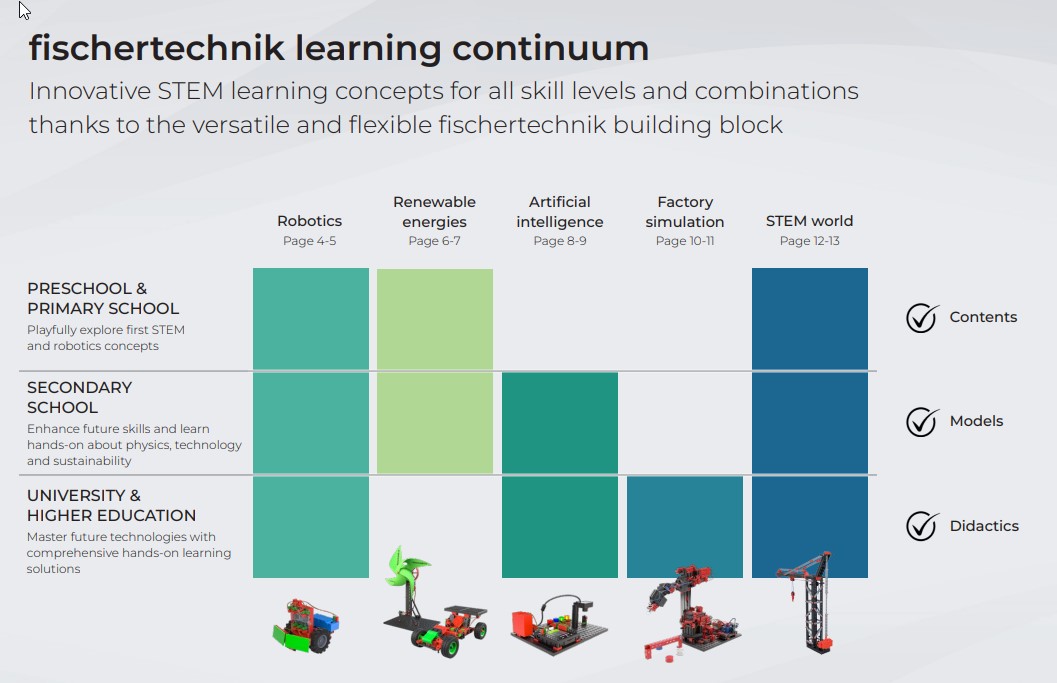
fischertechnik and its partners
To continuously develop its learning continuum, fischertechnik works together with renowned partners:
– Created by European Schoolnet, the Future Classroom Lab (FCL) is an inspirational, fully equipped, reconfigurable, teaching and learning environment in Brussels, challenging visitors to rethink the role of pedagogy, technology and design in their classrooms.
– The World Robot Olympiad is an international robotics competition for children and young people. The aim of the competition is to get participants interested in STEM subjects and motivate them to start an apprenticeship or degree programme in a technical field.
– mobile.schule is Germany’s largest platform for advanced training in all areas of digital education. For almost ten years, mobile.schule has been offering conferences, online conferences and training formats of all kinds. mobile.schule is based on the community. This means that hundreds of speakers and thousands of participants meet here, network, learn from each other and continue their education.
– With around 30,000 employees, the Fraunhofer-Gesellschaft zur Förderung der angewandten Forschung e. V. is the largest organisation for applied research and development services in Europe.Schwerpunktthemen
Robotik
Basic digital and computer science skills, especially „computational thinking“, will play a growing role in general education and should be taught as early as possible in the classroom. Robotics in the classroom offers a simple, hands-on approach to the world of computer science. In addition to exploring technological concepts, students expand their logical thinking, learn problem-solving skills and the ability to develop creative and innovative solutions to complex problems independently and in teams.
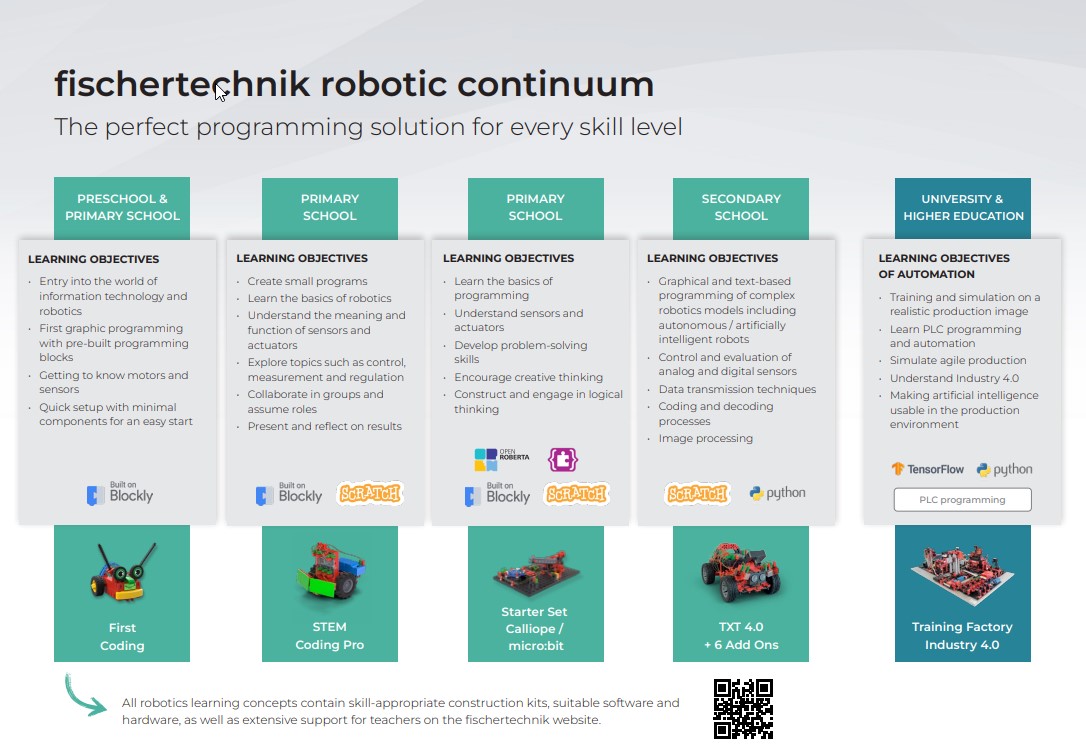
Renewable Energies
Regenerative or renewable energy refers to the provision of energy from sustainable sources such as sun, wind, water, geothermal energy or biomass. They are available in almost in exhaustible quantities. In contrast, the supply of fossil fuels such as coal, oil, natural gas and conventional nuclear fuels is continuously decreasing as consumption continues. These fossil fuels belong to the non-renewable energy sources. Once they have been burned in a power or heating plant, they are no longer available. They do not regenerate, they are devalued. However, the growing world population and the advancing technological development of mankind are leading to an enormous demand for energy, which is constantly increasing. It is also known that emissions of the greenhouse gas carbon dioxide (CO2 ) from the combustion of oil, natural gas and coal are very high and, according to current knowledge, are the cause of global warming. Renewable energies The most important energy sources of our future The transition from fossil and nuclear fuels to renewable energies is already in full swing. In addition to the increased expansion of renewable energies, reducing our energy consumption and increasing energy efficiency through technological progress are key issues and current challenges at the same time. In everyday life, we encounter the energy transition in electromobility in transport, when buying energy-efficient household appliances or when renovating buildings to make them more energy-efficient.
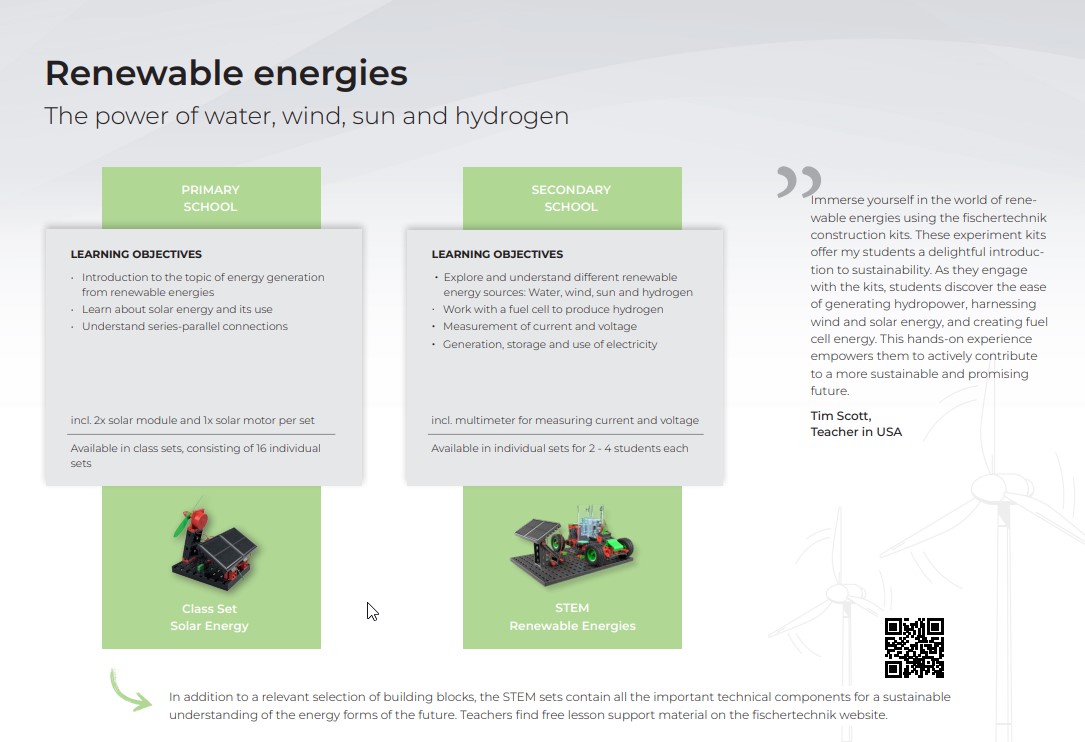
Artificial Intelligence
Artificial intelligence forms the basis of numerous innovations and is becoming an integral part of the world of work. According to a study by McKinsey, around 30 percent of the global workforce will need advanced AI skills by 2030. Incorporating AI into the curriculum promotes digital skills, critical thinking and interdisciplinary learning, giving students the opportunity to develop their own skills. Students are better prepared for the challenges and opportunities of modern society. It is not just about understanding AI, but also about raising a generation that can deal creatively with this transformative technology.
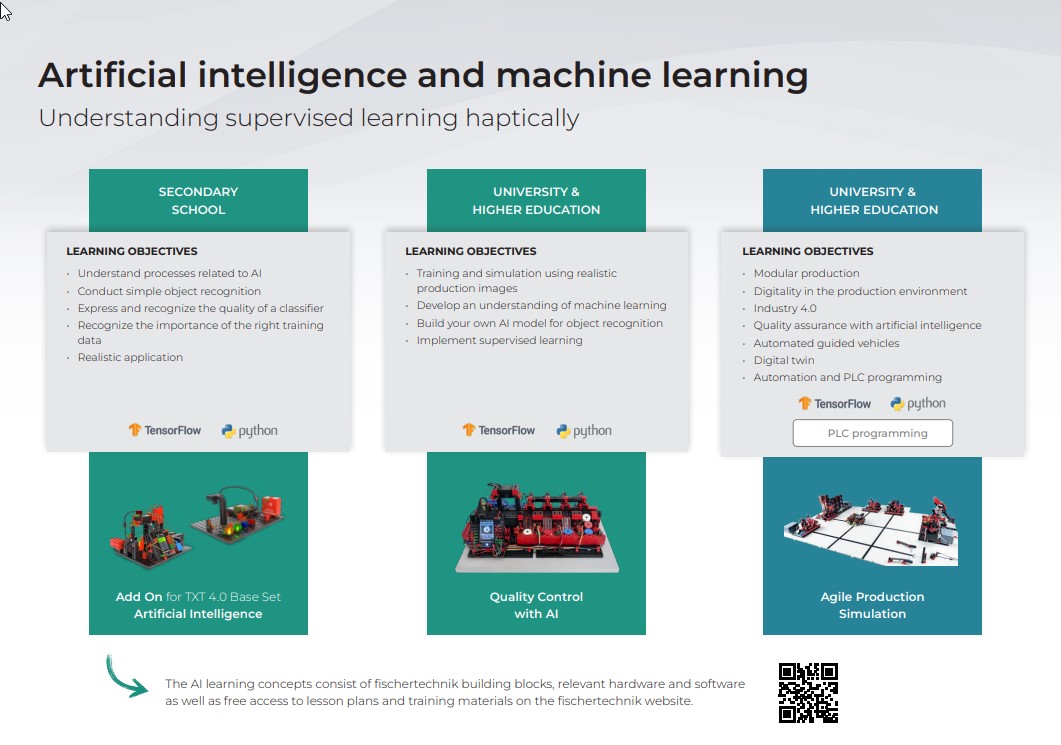
Industry 4.0
Industry 4.0 is a term that describes the fourth industrial revolution and refers to the progressive integration of digital technology into industrial production and manufacturing. It is a paradigm shift in the way products are manufactured and business processes are designed. Industry 4.0 encompasses a range of technologies and concepts such as the Internet of Things (IoT), artificial intelligence (AI) and machine learning, big data and data analysis or cloud computing. The goals of Industry 4.0 are increased efficiency, flexibility and productivity in industrial production. By integrating these technologies, companies can optimize their processes, reduce production costs, improve quality and mass-produce individual products (batch size 1).
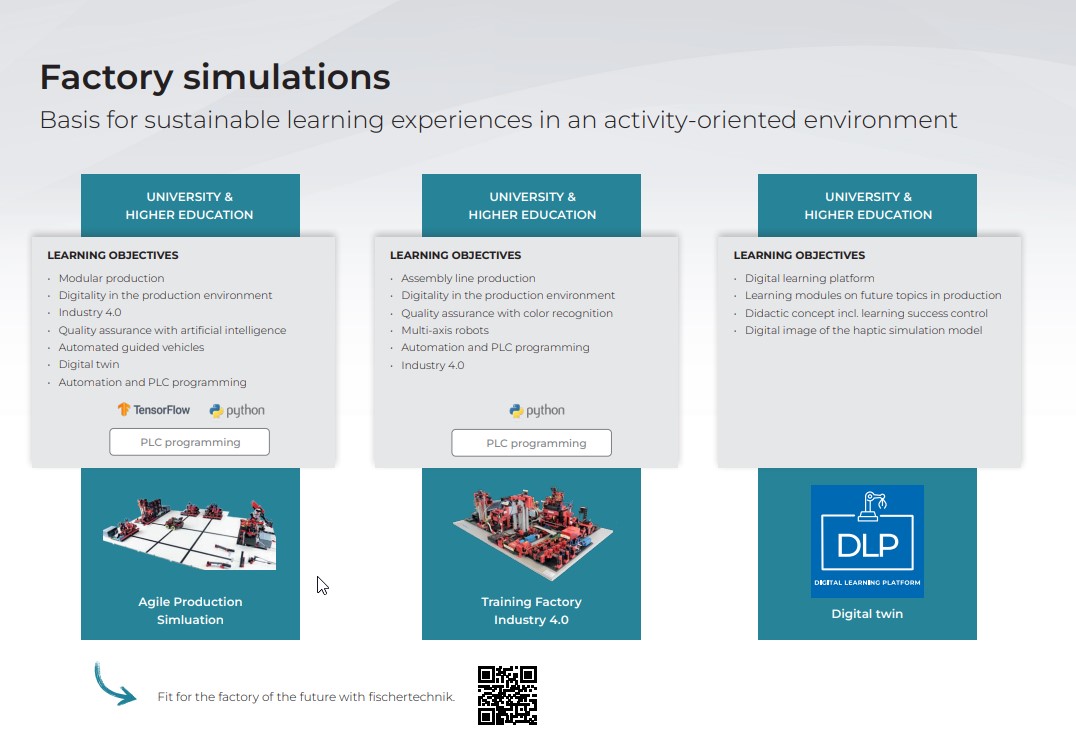
About fischertechnik
The educational equipment manufacturer fischertechnik comes from southern Germany. All components are produced in the region. The building blocks have been compatible with each other since their introduction in 1965. As part of the fischer group of companies, known worldwide for its innovative fastening solutions, fischertechnik benefits from decades of expertise in the manufacture of its high-quality building blocks. fischertechnik not only offers a learning concept that dramatically enhances lessons, but also educationally valuable toys to familiarise students with the technologies of tomorrow. The company also offers factory simulation systems – models measuring around 1 x 1 metre that can be used to depict all processes in a state-of-the-art factory – from Industry 4.0 processes to quality assurance using artificial intelligence and driverless transport systems.



